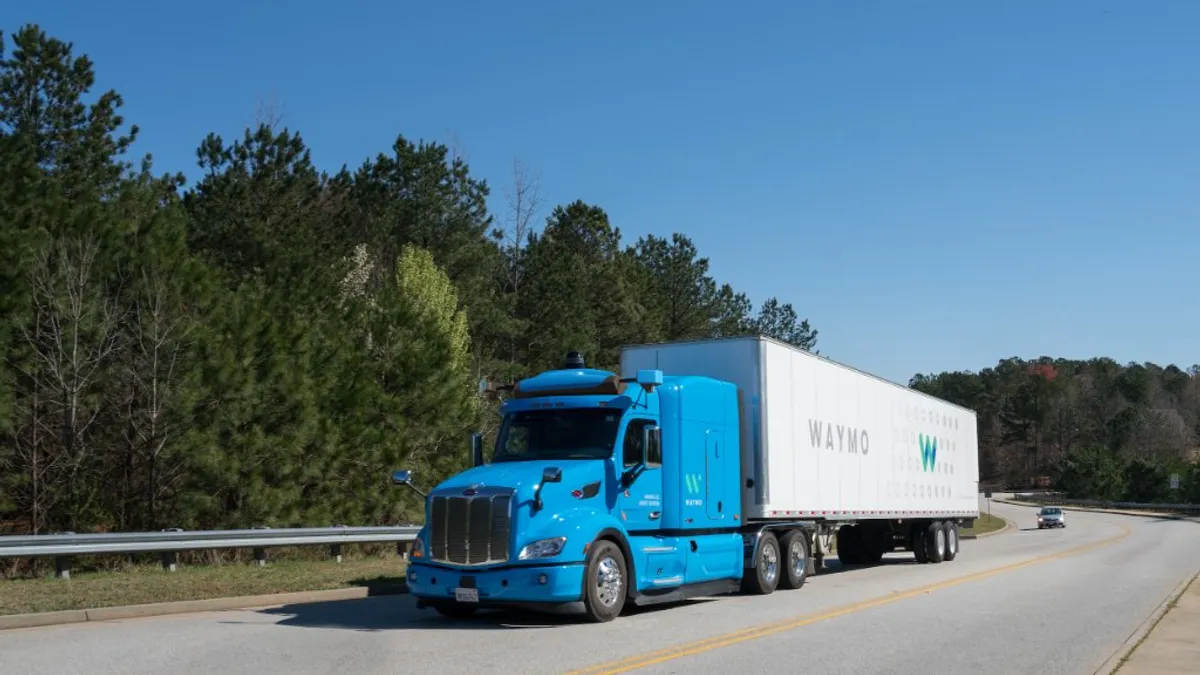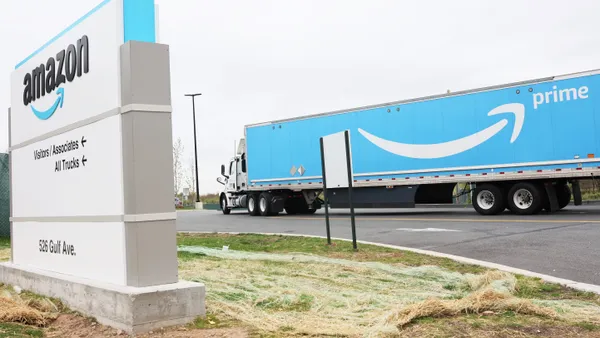Dive Brief:
- Waymo is expanding the testing of its autonomous long-haul trucks to Texas and New Mexico where it will drive along I-10, I-20 and I-45, the company announced this week.
- Waymo will map the "promising commercial route" between the states, a Waymo spokesperson told Supply Chain Dive in an email. The company did not say if it was testing with shippers, but last year it said it was working with "shippers, truck makers, and Tier One suppliers" on the development of Class 8 autonomous trucks.
- Waymo will use sensor-outfitted minivans to map the roads. "Next, we take that information and clean it up and add salient information to it, features such as crosswalks, road edges, curb heights, boundary paint, intersections, etc." the Waymo spokesperson said. "Then we put our newly-created map through quality control testing to ensure there are no errors."
Dive Insight:
Autonomous trucking has become increasingly crowded in recent years with companies pitching the technology as a way to avoid regulations that govern human drivers.
Though, two autonomous trucking companies, Kodiak Robotics and Embark, have suggested that hours of service (HOS) rules should apply to remote drivers. Both companies made these points when commenting on an Advanced Notice of Proposed Rulemaking (ANPRM) filed by the Federal Motor Carrier Safety Administration (FMCSA).
"HOS regulations should apply to any individual who could be called upon to assume control of an ADS-equipped CMV in a time-sensitive fashion," Kodiak Robotics said in its filing. It added that drivers in the sleeper birth should be considered off duty.
Embark said HOS should apply to remote drivers but said there wasn't enough information on other remote roles to know if HOS rules should apply.
Eliminating the concern of HOS is one benefit of autonomous trucks, Embark's Head of Public Policy Jonny Morris said. "If you imagine a vehicle that's not limited by hours of service it will be able to make a cross country trip in a matter of two days instead of the five or six that are required by a normal human driver," Morris said last year.
Waymo announced in 2018 it would use autonomous trucks to carry freight to Google data centers. (Waymo and Google are Alphabet companies.) Waymo partnered with Google's logistics team on the pilot that allowed the company to "further develop our technology and integrate it into the operations of shippers and carriers, with their network of factories, distribution centers, ports and terminals," it said in a 2018 blog post.
In comments filed last year with the FMCSA, Waymo's Head of Federal Policy and Government Affairs David Quinalty said the company "increasingly turned our attention to moving goods."
Last year, Kodiak Robotics began hauling loads for shippers with eight autonomous trucks. The company, co-founded by CEO Don Burnette, who has worked on self-driving operations at Google and Uber, plans to become a carrier and keep moving freight.
Some of the largest logistics operations in the country have shown interest in autonomous trucks.
It's been a year since an autonomous Embark truck was spotted hauling an Amazon trailer down I-10. And UPS has invested in the San Diego-based autonomous trucking company TuSimple. The United States Postal Service has also piloted TuSimple's technology with five round trips between Dallas and Phoenix.
Traditional truck manufacturers are beginning to show interest. Daimler Trucks last year acquired a majority stake in Torc Robotics, an autonomous vehicle software company, and shortly after announced plans to invest $556 million in an autonomous driving group to research the hardware and software required to operate autonomous trucks.
The government is also taking steps to allow for autonomous trucking. The most recent guidance from the Department of Transportation, released earlier this month, begins by saying the agency wants to "ensure the United States leads the world in automated vehicle (AV) technology development." It also points out that The National Institute for Occupational Safety and Health Strategic Plan for 2019–2023 prioritizes research on the health effects of AVs for truck, bus and taxi drivers.
Last year, the National Highway Traffic Safety Administration (NHTSA) and FMCSA each issued ANPRM going over plans to remove "unnecessary regulatory barriers to the safe introduction of automated driving systems" for commercial vehicles. Both ANPRM remain under review by the agencies and no decisions have been made, a spokesperson for the FMCSA told Supply Chain Dive.
Waymo, Kodiak Robotics, Embark and Uber all filed comments on the notice. Waymo specifically called for language that would not make a human driver a requirement in commercial motor vehicles so long as the vehicle operated with level four or five autonomous functionality.













